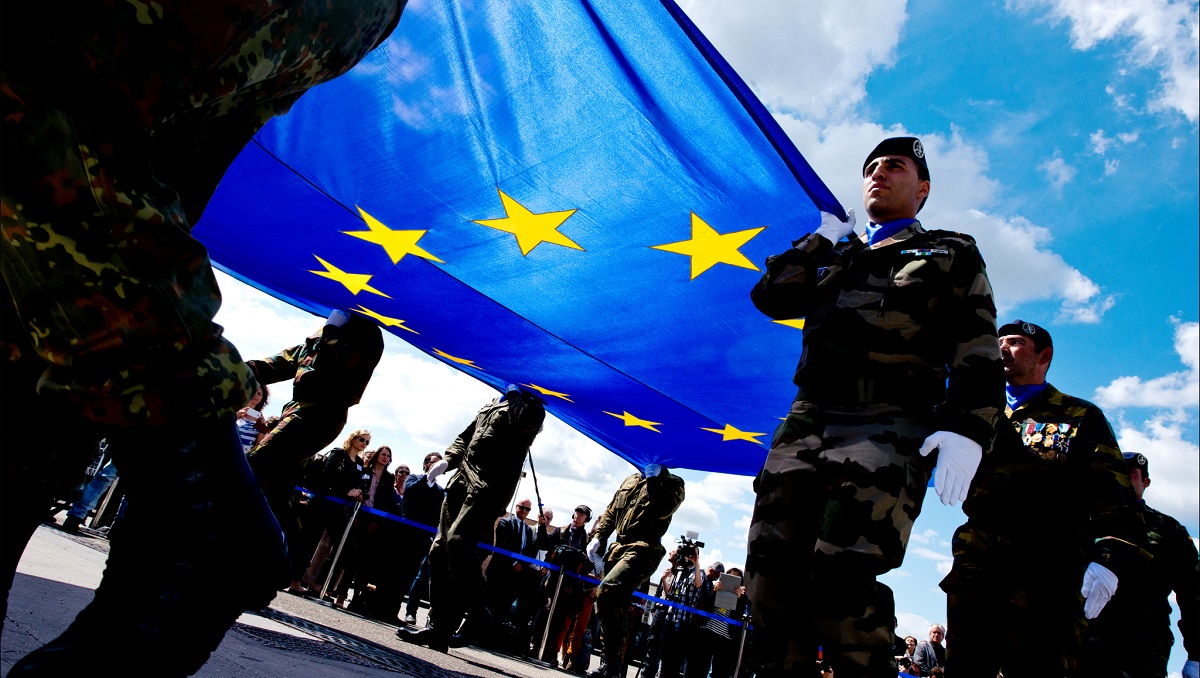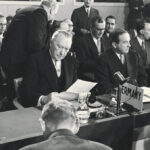
After all these years, many of the intricacies of the European Union remain a bit of a mystery. Even the relatively straightforward aspects of economic, legal, and regulatory union have many nuances of detail. But when it comes to matters of defense, then things get really complicated. What is the role of the EU in relation to both individual states and NATO, to which most but not all EU members also belong? Fortunately, we have an expert guide in Rear Admiral Henning Faltin, the Military Advisor at EU Delegations to the U.S. and to Canada. He joins podcast editor Ron Granieri to help explain what the EU does (and what it does not do) in Europe and around the world.
Constantly we developed structures within the European Union always keeping in mind that we didn’t want to duplicate resources. That’s a very important point for most nations that we don’t duplicate to NATO…structures need to be built to have an added value capability.
Podcast: Download
Henning Faltin is a flotilla admiral in the Navy of the Bundeswehr and, since February 2023, Military Advisor at EU Delegations to the U.S. and to Canada.
Ron Granieri is Professor of History and the Chair of the Department of National Security and Strategy at the U.S. Army War College and the Editor of A BETTER PEACE.
The views expressed in this presentation are those of the speakers and do not necessarily reflect those of the U.S. Army War College, U.S. Army, or Department of Defense.
Photo Credit: © European Union 2014 – European Parliament” (Attribution-NonCommercial-NoDerivs Creative Commons license)





If the problems that the world and the EU faces today; if these such problems can be traced to:
a. The U.S./the West’s post-Cold War effort to alter the political, economic, social and/or value orientation of the states and societies of the world (those both here at home and there elsewhere); this, so that same might be made to better interact with, better provide for and better benefit from such things as capitalism, globalization and the global economy. And can be traced to:
b. The resistance to — and the rebellion against (both here at home and there elsewhere) — these such initiatives (because same tends to — both here at home and there elsewhere — undermine the power, influence, control, status, privilege, safety, security, etc., of those who depend/who depended on the status quo/the status quo ante for these such benefits),
Then can the “defense” changes/enhancements — now being considered by the EU today — can these such changes/enhancements not be best understood from the “cause” and “effect” perspective that I provide immediately above?
(Immediately after the Cold War, there was little resistance/rebellion — and — thus — little need for “defense” capabilities by the EU, the U.S., etc. Of late, however, as the adverse-to-power-influence, control, etc., aspects of the U.S./the West’s post-Cold War “change” initiatives have become more obvious and more consequential [for example, to Russia and to “conservatives” worldwide], [a] hard-core and extensive resistance and rebellion efforts have become manifest in the world and, accordingly, [b] greater U.S./Western security enhancements, capabilities, etc., are now required?)
Note that, from the perspective that I offer above, (a) the need for enhanced EU (etc.) “defense” capabilities today, this seems to stem from (b) the recent rise (both here at home and there abroad) of resistance and rebellious activity against the political, economic, social and/or value changes that the U.S./the West has sought to achieve (both here home and there abroad) post-the Cold War.
Herein, given the British’s recent resistance/rebellious “mood” and corresponding Brexit, and the U.S.’s recent resistance/rebellious “mood” and corresponding election of Donald Trump in 2015 (and potentially again this year), is it — accordingly — beginning to dawn on the EU, that they could be standing alone when it comes to such things as dealing with a resisting/rebellious Russia? (To wit: a Russia that sees the EU’s efforts to achieve political, economic, social and/or value change on its door-step in Ukraine as an existential threat?)
An additional thought:
If one sees, for example, the problems in and/or emanating from such additional places as the Middle East and/or China today — these, also, from the perspective of the (now world-wide?) resistance to and rebellion against the political, economic, social and/or value changes that the U.S./the West has sought to achieve throughout the world post-the Cold War —
Then, from that such perspective also (i.e., from the perspective of a non-end of history world?), enhanced EU (etc.) “defensive” capabilities would seem to be required. Yes?
This, especially, if (a) the EU/the West has not yet decided to concede defeat and has, instead, (b) decided to continue to try to transform the world more along our (now ultra-contemporary/now ultra-modern?) political, economic, social and/or value lines?
(This such project, now accordingly, to [a] now be seen as being more of an up-hill battle; one, accordingly, which [b] requires “defensive” capabilities on a much larger scope and scale than — at the end of the Cold War — was initially anticipated?)
From a speech by President von der Leyen at the European Parliament Plenary on strengthening European defence in a volatile geopolitical landscape:
“Ultimately, this is about Europe taking responsibility for its own security. The simple truth is: We do not have the luxury of comfort. We do not have the control over elections or decisions in other parts of the world. And we simply do not have the time to skirt around the issue. With or without the support of our partners, we cannot let Russia win. And the cost of insecurity – the cost of a Russian victory – is far greater than any saving we could make now. This is why it is time for Europe to step up.
Long live Europe.”
Herein, do you think that von der Leyen’s statement, immediately above, that “we (the Europeans) do not have the control over elections or decisions in other parts of the world” — do you think that this might have something to do with/might be consistent with my “the British’s recent resistance/rebellious ‘mood’ and corresponding Brexit, and the U.S.’s recent resistance/rebellious ‘mood’ and corresponding election of Donald Trump in 2015 (and potentially again this year),” etc., observations, in my second comment above?
Likewise von der Leyen’s comment above — re: “with or without support of our partners” — this, also reflecting to how certain of the European Union’s partners and allies (the U.S., Great Britan, etc.?) (a) may not be able to be counted on anymore and, even, (b) may, ultimately, have to be considered more as part of the problem — this, rather than as part of the solution? (Thus, the EU needing, now, to be able to stand on its own?)